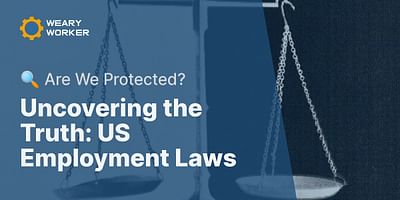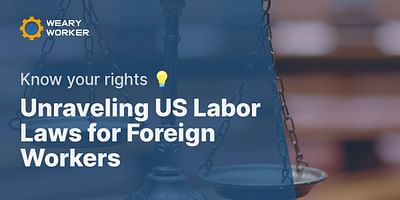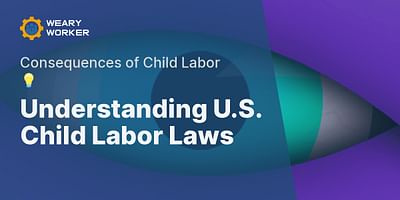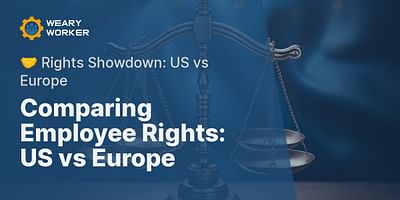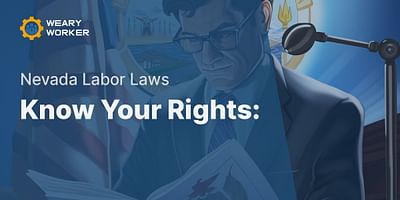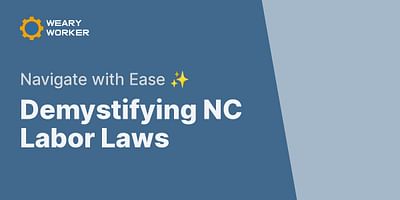Janet Durgan is an expert labor economist with a keen interest in data interpretation. She has a unique ability to break down complex labor matters and convey them in a clear and accessible manner. A true Californian at heart, Janet cherishes her beachside escapes.
Imagine a world without labor laws. It might seem like a realm of endless possibilities where employers and employees negotiate terms freely. However, the reality would likely be much more chaotic and potentially exploitative. Labor laws are established to protect workers' rights, ensure fair treatment, and maintain a balance of power between employers and employees. The absence of these laws would have significant global implications.
Let's Unpack the Threat of Worker Exploitation in a Lawless Labor World 🌍
Without labor laws, there would be no legal framework to prevent worker exploitation. Employers could demand excessive hours without providing overtime pay, offer inadequate wages, and create unsafe working conditions. Child labor, a grave issue that labor laws have helped to mitigate, could become rampant once again. For a deeper understanding of worker exploitation, refer to this article on Illinois Workers' Rights Amendment.
Diving into the Health and Safety Risks for Workers Without Labor Laws 😷
In a world devoid of labor laws, there would be no health and safety regulations to protect employees in their workplaces. This would likely lead to an increase in workplace accidents and illnesses, impacting the overall health of the global workforce. For more insights into workplace safety, check out this Nevada Labor Laws guide.
Could No Labor Laws Trigger Global Economic Instability? 💸
Without labor laws, economic instability could become a global issue. Employers could arbitrarily reduce wages or terminate employees without notice or reason, leading to increased poverty and financial insecurity. This could, in turn, lead to social unrest and economic instability on a global scale. For a comprehensive overview of the economic implications of labor laws, refer to this Georgia Labor Laws guide.
What Happens When Workers' Comp Disappears? An Insight into a World Without Labor Laws 🚑
The absence of labor laws would also mean the absence of workers' compensation laws. If an employee were injured at work, they would have no legal recourse to seek compensation for medical bills or lost wages. To understand more about workers' compensation, you may find this article on PA Labor Laws useful.
Worker Discrimination: The Unseen Consequence of a World Without Labor Laws ⚖️
Without labor laws, there would be no legal safeguards to protect workers from discrimination based on gender, race, religion, age, or disability. This could lead to widespread discrimination in the workplace, with no legal recourse for those affected. You can learn more about labor laws and discrimination in this NC Labor Laws guide.
In conclusion, the implications of a world without labor laws would be far-reaching and potentially devastating. Labor laws are crucial in maintaining fairness, safety, and dignity in the workplace. They provide a framework to protect workers' rights, prevent exploitation, and promote a balanced relationship between employers and employees. As we continue to navigate through the complexities of the global labor market, the importance of labor laws cannot be overstated.
Global Labor Laws Knowledge Check
Test your understanding of the implications of a world without labor laws.
Learn more about 🌍 Global Labor Laws Knowledge Check 🧠 or discover other Weary Worker quizzes.
Impact of Absence of Labor Laws on Global Workforce Health and Safety
Comparison of Worker Rights With and Without Labor Laws
To better understand the implications of a world without labor laws, let's compare the rights workers currently have under labor laws with what could happen without these laws.
| Worker Rights | With Labor Laws | Without Labor Laws |
|---|---|---|
| Prevention of Worker Exploitation | ✅ Employers are regulated by laws to prevent excessive demands and unfair treatment. | ❌ Employers could impose excessive demands and unfair treatment without legal repercussions. |
| Health and Safety | ✅ Laws exist to ensure a safe and healthy working environment. | ❌ No regulations would exist to protect workers from hazardous conditions and unsafe practices. |
| Economic Stability | ✅ Wages and termination rules are regulated, providing economic stability. | ❌ Employers could arbitrarily reduce wages or terminate employment, leading to economic instability. |
| Workers' Compensation | ✅ Laws provide compensation for workers injured on the job. | ❌ There would be no legal obligation for employers to compensate injured workers. |
| Protection Against Discrimination | ✅ Laws protect workers from discrimination based on gender, race, religion, etc. | ❌ There would be no legal safeguards to protect workers from discrimination. |
As we can see, labor laws play a crucial role in protecting worker rights, maintaining economic stability, and ensuring a safe and fair workplace. Without them, the consequences could be dire.
Do you think labor laws are crucial in maintaining a balanced relationship between employers and employees?
Given the potential implications discussed in this article, how crucial do you think labor laws are in maintaining a balanced relationship between employers and employees?




